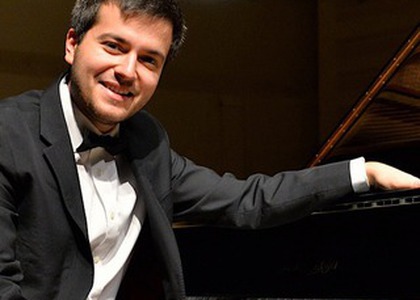> [Archived] Interviews

Interview with pianist Florian Mitrea, founder of the Hoinar Festival
The 5th edition of the "Hoinar" Festival, which first took place on December 2nd, continues with recitals and events taking place in Bucharest, at the Romanian Athenaeumand at the Great Hall of the ARCUB Center. Details about the organization of this edition, about the following events, but also about the education of young musicians during the pandemic are provided by Florian Mitrea, professor at the Royal Academy of Music in London and founder of the "Hoinar" Festival.
First of all, please tell us how the organization of this edition went and what is unique about this year.
During the pandemic year, as you can tell, it was quite difficult to organize the event,we faced a lot of uncertainties, a lack of possibility to plan things down to the last detail, but I'm very glad that the festival is happening. We already had the first concert in Brașov, with the Symphony Orchestra of the Brașov Philharmonic and we had a full hall, as much as possible within the limits of restrictions, which of course, we enjoyed very much and now we are waiting for the concerts in Bucharest. We hope that the Bucharest public will also understand to come to us. It took a lot of work. We have two great events, a piano recital and a musical theater show and we hope to attract as many people as possible.
Tell us a little bit about these two events, the recital and the musical theatrical show.
The first one takes place on Saturday, December 11th, at 19.00, at the Great Hall of the Romanian Athenaeum where I will share the stage of the Romanian Athenaeum with a very, very dear pianist, a close friend of the "Hoinar" Festival, his name is Nil Mladin. He participated at our first edition, in 2016. He was the first generation of "Hoinar" students and is currently a student in England, with a full scholarship. We are very proud of him and we are happy to present him on the big stage of the Athenaeum, in a solo piano and four-hand piano program, starting with Beethoven and ending with Liszt, Rachmaninov and Prokofiev. I hope that this will be a very attractive programe which will bring the public to the Great Hall of the Athenaeum. This program is really not to be missed, because he is a very hard working pianist, he is already extremely successful at the Royal Academy and I will try to introduce him to the public before playing, and next week, on December 14th, Tuesday, also at 19.00, at the Great Hall of the ARCUB Center in Bucharest, on Lipscani Street, Sarah Gabriel, who participated at our festival in 2019, returns to the festival, this time with a musical play written by herself. The musical is called "Dorothy Parker is going on a trip." A musical comedy, illustrated with jazz music, written by Gershwin, by Kurt Weill and actually tells the life and personality of this American journalist, Dorothy Parker, a failed novelist, in love with Hemingway, but at the same time a fierce fighter for equal rights. A fantastic character, which Sarah outlines in front of the audience through music and a frothy script, I dare say. To give you an idea, the characters include a pianist, a closet and a mortuary urn.
Music education is an area that you talk about during this festival, being a professor at the Royal Academy of Music in London, from your experience, how did the pandemic affect the master's courses and the actual work of the teacher with the young musicians?
It has affected it to a very large extent. Why do I care so much about the concert at the Athenaeum and the fact that Nil is coming to the festival, is because I want to show the public a proof of how we resisted under pressure during the pandemic. I had students who simply weren't able to do anything, I was practically doing therapy, Zoom counseling, instead of piano lessons, but Nil understood that he had to work hard during this pandemic period and actually needed a lot of courage, both on the part of the students and on our part, trying to support them as much as we can. I realize how old I was when I was traveling, going to competitions, festivals, summer schools, and all of a sudden we were all stuck, either in dorm rooms or in a study room, alone, without teachers, all haveing to be done remotely. It was actually a tragedy. But it is very important, I have said it, and I will say it again, in fact, the repair work will start when the pandemic ends. We already hope that we are nearing the end of it, and in fact, the hardest part is just beginning, when we will start togather, to meet eachother. And from this point of view, Nil Mladin was an example for his other colleagues and I hope that the Bucharest public will understand this when it sees us on stage at the Athenaeum.
Translated by Ana Spînu,
University of Bucharest, Faculty of Foreign Languages and Literatures, MTTLC, year I
Corrected by Silvia Petrescu














